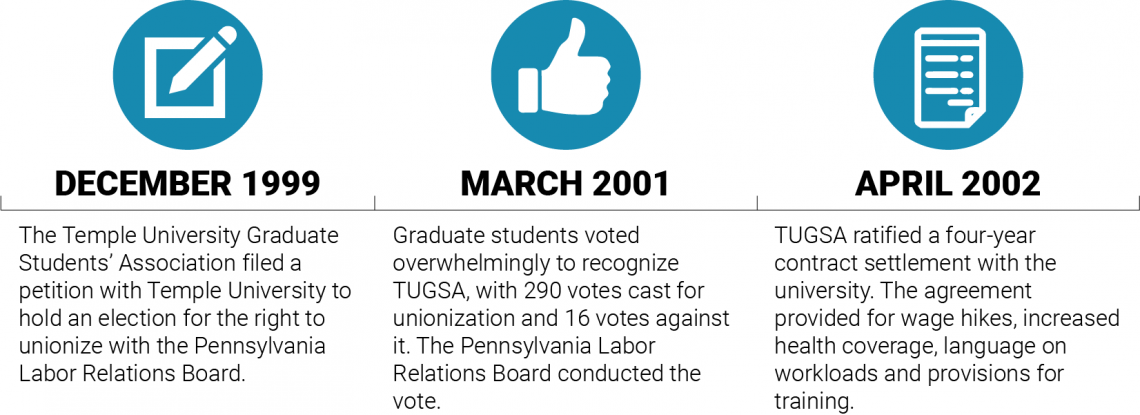
In 1997, a group of graduate students at Temple University began a four-year fight to create the Temple University Graduate Students’ Association, Pennsylvania’s only recognized labor union for graduate students.
The group sought restitution for financial issues like low wages without cost-of-living adjustments or grievance procedures. TUGSA was recognized legally and by the Board of Trustees in 2001 as one of more than 30 graduate student unions in the country, according to the Coalition of Graduate Employee Unions.
Now, TUGSA continues to battle for employee rights at Temple through advocacy and collective bargaining efforts every four years.
“That whole exercise of being a student here and having good faculty here and having good resources to use and having good opportunities is built into a system that’s fundamentally broken,” said Evan Kassof, the vice president of TUGSA and a music Ph.D. student.
When multiplying the number of students in class by the cost of the class, Kassof said he believes he brings in more than twice as much revenue for Temple than he makes each semester. As a Music Theory IV instructor, his annual salary is $17,600, he added.

Graduate students can serve as teaching or research assistants to make money, while finishing their degree.
“Historically, teaching assistants and research assistants are underpaid, overworked and exploited labor,” Kassof added. “The existence of the union is to help protect us from those powers that exploit our labor and intellectual prowess.”
TUGSA guarantees graduate student employees a base salary, health care subsidies and legal protections for expressing grievances.
When the idea for TUGSA began circulating in the 1990s, many graduate students were aware of their individual problems in the workspace but not a larger, institutional flaw, said Matt Ford, TUGSA’s director of community and a Ph.D. sociology student.
“A student in one department was experiencing something and was worried about their pay or hoping to get better benefits or having issues with getting overworked, [but] they weren’t aware if others were experiencing it,” Ford said. “People would be like, ‘Is it me? Is it my department?’”
Outside of Temple, graduate students across the country report being underpaid, overworked and suffering from poor mental health.
In this respect, improving graduate student working conditions can benefit the learning conditions for undergraduates too, Ford said.
“It’s important we are taken care of because that allows the undergraduates to get a better education,” Ford said. “You’re gonna get a better education if the teacher has slept well and reviewed the material versus someone who has worked too many hours. It’s about a passion for teaching and also making sure the work we do is received well.”
If more undergraduates attended TUGSA meetings, took time to get to know their teaching assistants and adjuncts, they could help TUGSA fight for the accommodations they need, Kassof said.
“They pay more in a semester than I make in a year,” he added.
“We firmly believe that undergraduates have the most power on the university campus,” Ford said. “The experience on campus is a shared one, so working together is essential to bettering the experience for everybody.”
TUGSA wants to collaborate with student organizations and other on-campus unions to better represent the student body, Destinee Grove, TUGSA’s president and a kinesiology master’s student, said.
“Partnering with TSG and uniting with other student organizations to get that united front would be a great first step,” Grove added.
Although the union fights the university on many issues, it is not “anti-Temple,” Ford added.
“It’s not that [TUGSA’s] existence is meant to be entirely antagonistic to the university,” Ford said. “We feel it’s important that graduate workers aren’t forgotten when the system is operating and making sure people are taken care of and not forgotten.”


Be the first to comment